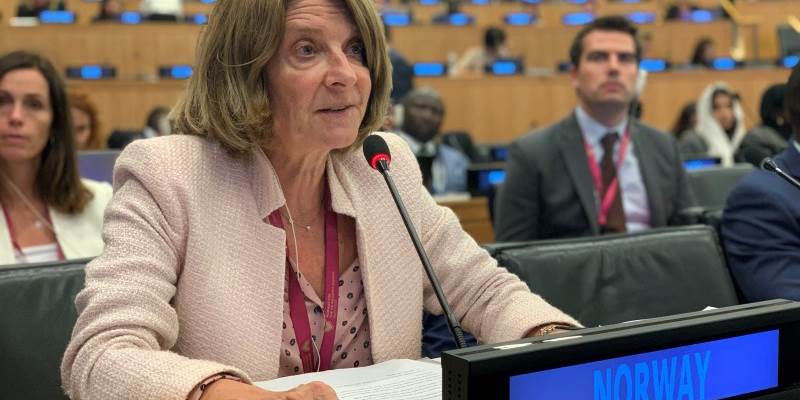Check against delivery
Chair,
The Climate Action Summit saw young activists take centre stage, telling world leaders it is time to stop talking. We must step up, speed up and scale up.
The message from our Small Island Developing States partners was equally clear. They are already paying the price of climate change.
The most recent disaster in the Caribbean has again highlighted that disasters wipe out hard fought development gains. Putting on full display the urgent need to manage and reduce disaster risk.
We know that unchecked climate change will destroy lives and livelihoods. With Small Island States and Least Developed Countries facing the toughest consequences from droughts to floods and hurricanes.
If the climate emergency is not halted, the world will witness setbacks no agenda can mend.
Chair,
Closely linked to climate change is the loss of the planet’s biological diversity.
An alarming number of species are becoming extinct. Unprecedented environmental challenges threaten our food systems, our health, our livelihoods and our security.
Solutions to preserve nature and mitigate climate change are interconnected. We need to solve these problems in concert.
For our part, Norway aims to respond to these challenges with action and ambition:
We are doubling our contribution to the Green Climate Fund.
We are substantially stepping up our efforts in building climate resilience. Making it a main priority in Norway’s development assistance in the coming years.
We will highlight the links between security and sustainable development, including related to climate change.
We will strengthen our nationally determined contribution under the Paris Agreement, and urge others to do the same.
And we will work hard as President of the United Nations Environment Assembly to ensure progress is being made.
Ensuring the health of the planet remains essential to achieving the 2030 Agenda for Sustainable Development.
Chair,
The SDG Summit’s message could not have been clearer:
We are not on track to reach the Sustainable Development Goals by 2030.
If we are serious about leaving no one behind, we must align leadership and ownership, with policies and planning.
Mobilizing finance for the SDGs is a common factor here. Including from the private sector.
Domestic resource mobilisation needs to be strengthened.
Fair and predictable taxation regimes must be put in place. This is not only good for government revenue, it is good for business.
Likewise, we need a broad and forceful international coalition to fight corruption.
Illicit financial flows must be stopped. The very few who gain, do so at the cost of many. Integrity, transparency and accountability are key ingredients in this fight.
ODA of course also remains important, in particular for Least Developed Countries. Norway is proud to allocate 1% of GDP to ODA, well above the UN target of 0,7%. We have met this target for the past decade and will continue to honour this commitment in the future.
We have also seen that investing in quality education, especially for girls, is vital towards sustainable development.
Spending on education, health and gender equality is not a cost. It is an investment. One with high returns as a driver for economic growth and development.
Chair,
We still have a way to go. Serious challenges remain to achieving the Goals. But, I want to take this opportunity to recognise that many countries are charting good progress.
National presentations (VNRs) have shown us that governments are proactively implementing the 2030 Agenda.
You inspire us to further action!
Voluntary National Reviews have truly been a useful practice. And in November we are pleased to host, together with DESA, a workshop to assist countries preparing for their VNRs.
We look forward to welcoming you to Oslo!
Chair,
Having set out only some of the challenges facing us, and some of the actions we need to take as Member States. My final point is on the UN system, and its role in supporting Member States in their implementation of the 2030 Agenda.
Together, we have agreed on an ambitious reform, towards a UN which delivers better results. In a more coherent, integrated, and efficient way.
We have now entered the implementation phase. In order to succeed, buy in from all parts of the UN system and Member States is crucial.
Holding the Presidency of ECOSOC, Norway will do its part to maintain clear priorities on Financing for Development, UN reform, and gender equality.
Chair,
To conclude, we look forward to fruitful deliberations in this session of the Second Committee.
Norway remains a committed, consistent partner, to safeguard our common future. We acknowledge the value of multilateralism, and hope to return to consensus as the norm in the work of this committee.
Let us be inspired by the young and strong voices from the Climate Action Summit. To go a little further and jointly find solutions.
